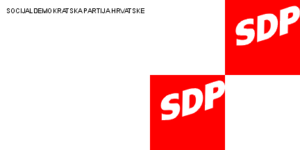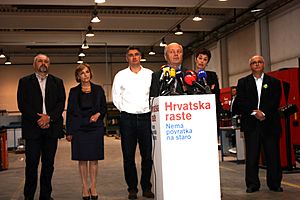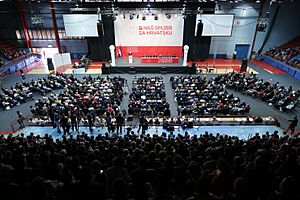Social Democratic Party of Croatia facts for kids
Quick facts for kids <div style="padding-top:0.3em; padding-bottom:0.3em; border-top:2px solid Lua error in Module:European_and_national_party_data/config at line 227: attempt to index field 'data' (a nil value).; border-bottom:2px solid Lua error in Module:European_and_national_party_data/config at line 227: attempt to index field 'data' (a nil value).; line-height: 1;">
Social Democratic Party of Croatia
Socijaldemokratska partija Hrvatske
|
|
|---|---|
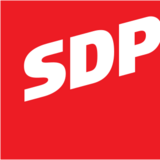 |
|
| Abbreviation | SDP |
| President | Siniša Hajdaš Dončić |
| Vice Presidents |
See list
Biljana Borzan
Mirela Ahmetović Mišel Jakšić Ranko Ostojić |
| Founder | Ivica Račan |
| Founded | 3 November 1990 |
| Preceded by | League of Communists of Croatia (SKH) |
| Headquarters | Trg Drage Iblera 9, Zagreb |
| Youth wing | SDP Youth Forum |
| Membership (2020) | 32,000 |
| Ideology | Social democracy |
| Political position | Centre-left |
| National affiliation | Rivers of Justice (since 2010) |
| European affiliation | Party of European Socialists |
| International affiliation |
|
| European Parliament group | Progressive Alliance of Socialists and Democrats |
| Colors | Red |
| Slogan | "Sloboda. Jednakost. Solidarnost." ("Freedom. Equality. Solidarity.") |
| Sabor | Lua error in Module:European_and_national_party_data/config at line 227: attempt to index field 'data' (a nil value). |
| European Parliament | Lua error in Module:European_and_national_party_data/config at line 227: attempt to index field 'data' (a nil value). |
| County Prefects |
3 / 21
|
| Mayors |
19 / 128
|
| Municipalities |
53 / 428
|
| Party flag | |
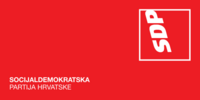 |
|
| Website | |
| Lua error in Module:European_and_national_party_data/config at line 227: attempt to index field 'data' (a nil value). | |
The Social Democratic Party of Croatia (often called SDP) is a political party in Croatia. It believes in social democracy, which means it supports ideas like fairness, equality, and helping people in society. The SDP is also against fascism and strongly supports cooperation with other European countries.
The party started in 1990. It came from the League of Communists of Croatia, which was the ruling party in Croatia when it was part of Yugoslavia.
The SDP first won elections in 2000 and formed a government with other parties. Ivica Račan was the leader of this government. After losing the 2003 election, the party was in opposition for eight years. In 2011, the SDP won many seats in the Croatian Parliament and formed a new government with Zoran Milanović as Prime Minister.
After the 2015 election, the SDP returned to being an opposition party. Some important members of the SDP have held high positions. Ivo Josipović, a former SDP member, was the President of Croatia from 2010 to 2015. Another SDP member, Neven Mimica, worked as a European Commissioner.
The SDP is part of several international groups. These include the Party of European Socialists (PES) and the Socialist International (SI).
Contents
History of the SDP
Starting in the 1990s
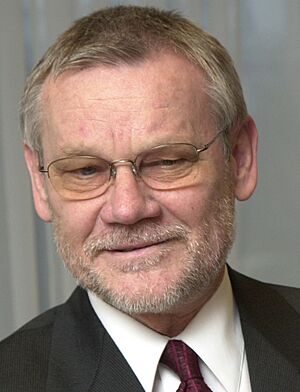
The SDP was officially created on November 3, 1990. It was formed by a group from the old League of Communists of Croatia (SKH). This group wanted to create a new party based on social democratic ideas.
The SKH delegation, led by Ivica Račan, left a big meeting in January 1990. They disagreed with the Serbian delegation about how Yugoslavia should be organized.
Around this time, Croatia was getting ready for its first multi-party elections. The SKH decided to hold elections in April and May 1990. In February 1990, the Croatian parliament changed the rules to allow many political parties. The SKH then changed its name to the "Party of Democratic Reform" (SKH-SDP). In the 1990 election, they came in second place.
On November 3, 1990, the party officially became the "Social Democratic Party of Croatia," dropping the old SKH part of its name. In the August 1992 election, the SDP won 5.52% of the votes and 11 seats in parliament. In 1993, they shortened their name to just "Social Democratic Party."
Joining with Another Party
In 1990, another party called the Social Democratic Party of Croatia (SDSH) was also founded. This party later changed its name to the Social Democrats of Croatia (SDH). It was one of the few parties at the time that called itself "left-wing." Many smart people helped start this party.
In the 1990 election, the SDSH did not win many seats. However, they were strong enough to have ministers in the government from 1991 to 1992.
Before the 1992 elections, the SDSH and the SDP had disagreements about their names. The election showed that the SDP was much stronger. This led to the SDSH joining the SDP in April 1994.
In the 1995 election, the SDP won 8.93% of the votes and 10 seats in parliament. They came in fourth place.
The Račan Government (2000–2003)
In 1998, the leaders of the SDP and another party, HSLS, agreed to work together. They ran in the January 2000 parliamentary elections as a team. This group won the election with 38.7% of the votes and 71 seats.
The SDP and HSLS then formed a government with four other parties. Ivica Račan, as the leader of the strongest party, became the Prime Minister. This time was difficult because the parties in the government often disagreed.
In 2001, one party left the government. In 2002, the government broke apart when the HSLS refused to support an agreement about a power plant.
A new government was formed in July 2002 with the remaining parties and two smaller ones. This government stayed in power until the November 2003 elections. The SDP and its partners lost to the conservative HDZ party. The SDP then returned to being an opposition party.
The 2000 election win was a big moment for Croatia. It was the first time power changed hands peacefully in the country's young democracy. Račan's government was seen as very supportive of Western countries. During their time in power, Croatia took steps towards joining the European Union. However, the government struggled with economic problems and unemployment.
Being in Opposition (2003–2011)
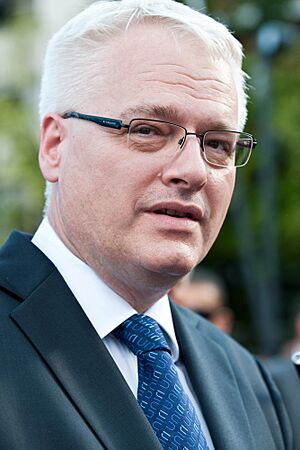
In the 2005 presidential election, the SDP supported Stjepan Mesić, who was already president. He won his second term with a large number of votes.
In 2007, the party faced a sad event when their long-time leader, Ivica Račan, passed away. He had been sick with cancer. After his death, Zoran Milanović was chosen as the new leader of the party.
For the November 2007 parliamentary election, the SDP had an economic plan created by Ljubo Jurčić. He was also chosen as their candidate for Prime Minister. The SDP came in second place, very close behind the HDZ. They did not form a government and became the largest opposition party.
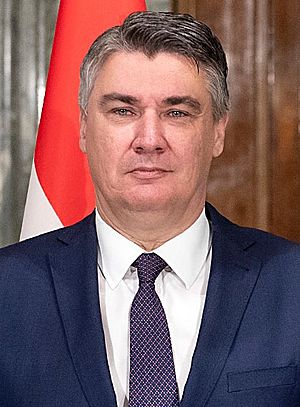
In the June 2009 local elections, the SDP won important victories in several cities. They gained control in places like Dubrovnik and Vukovar, which were usually strongholds for the HDZ. They also kept control of major cities like Zagreb and Rijeka.
Before the 2009–10 presidential election, the SDP held a special vote to choose their candidate. Ivo Josipović won this vote. He then went on to win the presidential election in 2010 and became the President of Croatia.
The Milanović Government (2011–2015)
In 2010, the SDP formed a group called the Kukuriku coalition with three other parties. They worked together for the December 2011 parliamentary election. This group won the election, getting 81 out of 151 seats in parliament.
After the win, the SDP formed a government with two of its partners. The party president, Zoran Milanović, became the new Prime Minister on December 23, 2011.
The Milanović government started by making several new laws. They passed a law about medically assisted fertilization and introduced health education in schools. They also announced plans to expand rights for same-sex couples. In 2013, a public vote was held to add a rule to the constitution against same-sex marriage. The SDP was against this rule, but it passed. Milanović's government then passed the Life Partnership Act in 2014, which gave rights to same-sex couples.
The government faced several challenges during its time. These included a long period of economic difficulty, protests, and the European migrant crisis.
The government made a new law about taxes and helped people who had loans in Swiss francs. In 2015, they decided to change Swiss franc loans into euro loans to help borrowers.
The government also made changes to taxes to deal with the tough economic situation. They cut some social payments and public worker salaries. However, the economy still struggled, and unemployment was high.
The difficult economy made people less supportive of the Milanović government. In the 2013 European Parliament elections, the SDP won five representatives, one less than the main opposition party. In the 2014 European Parliament elections, they won four. The party supported Ivo Josipović in the 2014–15 presidential elections, but he lost to Kolinda Grabar-Kitarović from the HDZ.
Being in Opposition (2015–Present)
In the 2015 parliamentary elections, the SDP and its partners won 56 out of 151 seats. They tried to form a new government with another party, but they could not agree. An independent person, Tihomir Orešković, then formed a government with the support of the Patriotic Coalition.
On April 2, 2016, the SDP held elections for its leader. Zoran Milanović was re-elected as president of the SDP.
In June 2016, the government lost a vote of no confidence, which led to an early election in November. The SDP ran as the largest party in the People's Coalition. Even though many thought they would win, the People's Coalition won only 54 seats, while the Croatian Democratic Union (HDZ) won more. After this, Zoran Milanović announced he would not run for party leader again and would leave politics.
In the next leadership election, Davor Bernardić was chosen as the third chairman of the SDP in November 2016.
In the 2020 parliamentary elections, the SDP had its worst result since the 1990s. Davor Bernardić resigned as leader the day after the election. Peđa Grbin was then chosen as the new leader in October 2020.
In July 2021, some disagreements happened within the party. Several members were expelled. These expelled members and their supporters then formed a new group in parliament called the Social Democrats Club. They later started a new party called the Social Democrats in July 2022. This left the SDP with fewer representatives in parliament.
How the SDP is Organized
The first and longest-serving president of the SDP was Ivica Račan. The current president of the party is Siniša Hajdaš Dončić. He was chosen in a leadership election on September 21, 2024, after Peđa Grbin resigned.
Besides the president, the party has four vice-presidents: Biljana Borzan, Mirela Ahmetović, Ranko Ostojić, and Mišel Jakšić. The main groups that run the party are the party presidency, the head committee, and the supervisory committee.
Like other parties, the SDP has local groups in different towns, cities, and counties. It also has special groups for young people (Youth Forum), women (Women's Forum), seniors (Seniors' Forum), and the SDP Queer Forum.
The SDP has been a member of the Socialist International since 1999. It became a full member of the Party of European Socialists in 2012. The SDP is also a full member of the Progressive Alliance of Socialists and Democrats (S&D) group in the European Parliament since Croatia joined the EU in 2013.
Election Results
The following shows how the SDP has done in elections for the Croatian parliament. The "Votes won" and "Percentage" columns include votes won by groups the SDP was part of. The "Total seats won" column only counts seats won by the SDP.
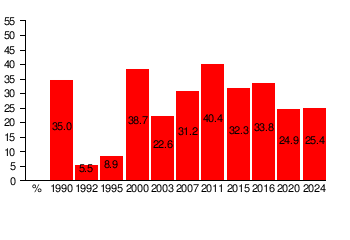
Parliamentary Elections (Sabor)
The Sabor is the Croatian Parliament, where laws are made.
| Election | In coalition with | Votes | % | Seats | +/– | Government |
|---|---|---|---|---|---|---|
| Coalition | SDP | |||||
| 1990 | SSH | 1,001,967 | 35.0 (#2) |
107 / 351
|
Opposition | |
| 1992 | None | 145,419 | 5.5 (#3) |
11 / 138
|
Opposition | |
| 1995 | None | 215,839 | 8.9 (#4) |
10 / 127
|
Opposition | |
| 2000 | HSLS-PGS-SBHS | 1,138,318 | 38.7 (#1) |
43 / 151
|
Government | |
| 2003 | LIBRA–IDS-LS | 560,593 | 22.6 (#2) |
34 / 151
|
Opposition | |
| 2007 | None | 775,690 | 31.2 (#2) |
56 / 151
|
Opposition | |
| 2011 | HNS–IDS–HSU | 958,312 | 40.4 (#1) |
61 / 151
|
Government | |
| 2015 | HNS-HSU-HL-AHSS-ZS | 744,507 | 32.31 (#2) |
42 / 151
|
Opposition | |
| 2016 | HNS-HSU-HSS | 636,602 | 33.82 (#2) |
38 / 151
|
Opposition | |
| 2020 | HSS-GLAS-IDS-HSU-PGS-NLDB | 414,615 | 24.87 (#2) |
33 / 151
|
Opposition | |
| 2024 | CENTAR-HSS-GLAS-DO i SIP-NS-R | 538,748 | 25.40 (#2) |
37 / 151
|
Opposition | |
European Parliament Elections
The European Parliament is where representatives from countries in the European Union work together.
| Election | List leader | Coalition | Votes | % | Seats | +/– | EP Group |
|---|---|---|---|---|---|---|---|
| Coalition | SDP | ||||||
| 2013 | Tonino Picula | HNS–HSU | 237,778 | 32,07 (#2) |
5 / 12
|
New | S&D |
| 2014 | Neven Mimica | HNS–HSU-IDS- SDSS | 275,904 | 29,93 (#2) |
2 / 11
|
||
| 2019 | Tonino Picula | None | 200,976 | 18,71 (#2) |
4 / 12
|
||
| 2024 | Biljana Borzan | DO i SIP–CENTAR–HSS–GLAS | 192,859 | 25,62 (#2) |
4 / 12
|
||
Presidential Elections
The President of Croatia is the head of state.
| Election year(s) | Candidate | 1st round | 2nd round | Result | ||
|---|---|---|---|---|---|---|
| Votes | % | Votes | % | |||
| 1992 | Silvije Degen | 108,979 | 4.1 (#5) | Lost | ||
| 1997 | Zdravko Tomac | 458,172 | 21.03 (#2) | Lost | ||
| 2000 | Dražen Budiša | 741,837 | 27.8 (#2) | 1,125,969 | 43.99 (#2) | Lost |
| 2005 | Stjepan Mesić | 1,089,398 | 48.92 (#1) | 1,454,451 | 65.93 (#1) | Won |
| 2009–10 | Ivo Josipović | 640,594 | 32.42 (#1) | 1,339,385 | 60.26 (#1) | Won |
| 2014–15 | 687,678 | 38.46 (#1) | 1,082,436 | 49.26 (#2) | Lost | |
| 2019–20 | Zoran Milanović | 562,783 | 29.55 (#1) | 1,034,170 | 52.66 (#1) | Won |
| 2024–25 | 797,938 | 49.68 (#1) | 1,122,859 | 74.68 (#1) | Won | |
Party Presidents Since 1990
| No. | Leader | Age | Term start | Term end | Duration | |
|---|---|---|---|---|---|---|
| 1 |  |
Ivica Račan | 1944–2007 | 3 November 1990 | 11 April 2007 | 16 years, 159 days |
| — |  |
Željka Antunović (acting president) |
b. 1955 | 11 April 2007 | 2 June 2007 | 52 days |
| 2 |  |
Zoran Milanović | b. 1966 | 2 June 2007 | 26 November 2016 | 9 years, 177 days |
| 3 |  |
Davor Bernardić | b. 1980 | 26 November 2016 | 6 July 2020 | 3 years, 223 days |
| — |  |
Zlatko Komadina (acting president) |
b. 1958 | 6 July 2020 | 3 October 2020 | 89 days |
| 4 |  |
Peđa Grbin | b. 1979 | 3 October 2020 | 21 September 2024 | 3 years, 354 days |
| 5 |  |
Siniša Hajdaš Dončić | b. 1974 | 21 September 2024 | present | 1 year, 144 days |
See also
- Elections in the Social Democratic Party of Croatia
- Cabinet of Ivica Račan I
- Cabinet of Ivica Račan II
- Cabinet of Zoran Milanović
- Left-wing politics in Croatia
 | Isaac Myers |
 | D. Hamilton Jackson |
 | A. Philip Randolph |


